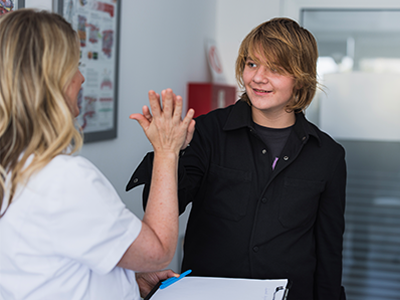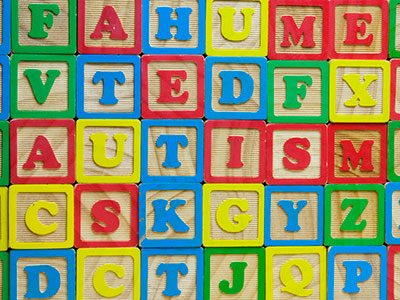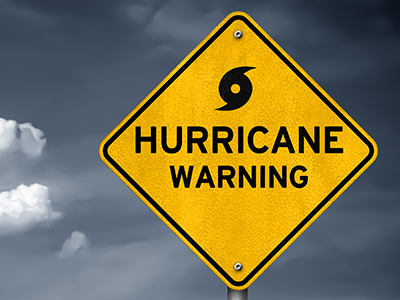Puberty is a time of significant developmental change. The hormonal changes associated with puberty impact brain growth, leading to changes in cognition, behavior and emotions. Puberty also occurs during a time of increased social and executive functioning demands when youth are working toward greater independence.
Many parents of youth (with and without autism) feel apprehensive about puberty and discussions of sexual health. Common concerns include hygiene, increased social vulnerability and balancing independence with supervision. It can be challenging to know what to discuss with your child and how to best support them through this stage.
The good news is that puberty is usually not as bad as expected! Many youth do not have significant worsening of symptoms during this time. Families also often feel conversations about puberty are smoother than anticipated. Importantly, your child wants to learn! In a research survey1, autistic women expressed wanting more information about puberty, including what to expect and why changes were happening. Education about puberty is thus critical to build independence and self-advocacy.
When should I start talking about puberty?
Begin talking about puberty before pubertal changes occur. Most youth start demonstrating physical changes associated with puberty around age 8-10; however, instruction can start early in life and gradually become more detailed and complex as your child matures. Talking about puberty early allows for a slower, more gradual approach and helps prepare youth for unexpected changes.
We also encourage you to speak with your child’s medical providers and/or therapists before puberty begins, as well as throughout puberty. They can help you identify appropriate resources and can monitor any changes in mood or behavior that occur.
What are the best ways to teach and support my child?
The needs of each youth will vary, and instruction should be tailored to your child and their learning style. Many tools you already use for education and behavioral management can be applied to discussing puberty. It is often helpful to use a range of strategies and supports, adjusting based on your child’s development and response to instruction. Regardless of the specific strategies used, is critical to communicate openly and focus on promoting safety, respect and dignity.
- Normalize that pubertal changes are often unfamiliar and unexpected.
- Preparation is essential! Prepare youth in advance for physical/emotional changes.
- Partner with educators, therapists and medical providers.
- Identify realistic goals, and gradually work on steps toward your goals.
- Prioritize basic, functional skills first. The more intimate the skill, the more important it is to work on.
- Use scripts, social stories, checklists and visual schedules.
- Demonstrate using models, drawings and/or pictures.
- Use apps, calendars, etc.
- Be mindful about the language you use to avoid literal interpretations.
What topics should I consider discussing with my child?
There are many topics to consider when discussing pubertal changes and sexual health. Any teaching should be consistent with your family values and cultural beliefs and your child’s sexual and gender identities. The list below is by no means comprehensive and may not fit for every family, but rather, can be used as a starting point for generating topics for discussion:
- Teach about bodies, reproduction, reproductive anatomy and risk reduction.
- Discuss physical changes that occur during puberty, including how they may feel, when they are likely to occur and why these changes are happening.
- Teach youth how to close and lock the bathroom door, use public restrooms, clean and shower themselves and maintain personal hygiene (e.g., deodorant, shaving, etc.).
- Teach your child about appropriate and inappropriate touching, as well as behaviors that can be done in public and those that are only done in private.
- Discuss “What if?” scenarios with your child. For example, “What if your period starts at school?” or “What if your get an erection in front of the class?” Together, work out possible solutions to these scenarios (e.g., preparing a period kit that can be kept in a backpack).
- Teach your child that healthy, mature relationships are reciprocal and respectful.
What tools are available?
We are providing many resources because we know that every family has unique needs.
- Steward, R., Crane, L., Roy, E.M., Remington, A., & Pellicano, E. (2018). ”Life is much more difficult to manage during periods”: Autistic experiences of menstruation. Journal of Autism and Developmental Disorders, 48, 4287-4292. doi: 10.1007/s10803-018-3664-0
 https://riseandshine.childrensnational.org/wp-content/uploads/2025/06/boy-with-concussion-Feature.jpg
300
400
Danielle Robbins
https://riseandshine.childrensnational.org/wp-content/uploads/2017/11/childrens_riseandshine_logo.jpg
Danielle Robbins2025-06-11 11:47:322025-06-11 11:47:32Concussions in Autistic children
https://riseandshine.childrensnational.org/wp-content/uploads/2025/06/boy-with-concussion-Feature.jpg
300
400
Danielle Robbins
https://riseandshine.childrensnational.org/wp-content/uploads/2017/11/childrens_riseandshine_logo.jpg
Danielle Robbins2025-06-11 11:47:322025-06-11 11:47:32Concussions in Autistic children



 Eliana Sudikoff, PhD, is a pediatric neuropsychologist who specializes in the neuropsychological evaluation of children and adolescents with complex medical conditions, autism spectrum disorders (ASD) and other neurodevelopmental and acquired conditions.
Eliana Sudikoff, PhD, is a pediatric neuropsychologist who specializes in the neuropsychological evaluation of children and adolescents with complex medical conditions, autism spectrum disorders (ASD) and other neurodevelopmental and acquired conditions.
 Meagan Wills, PhD, was a clinical psychologist at the Center for Autism Spectrum Disorders (CASD) at Children's National. She specializes in the diagnostic assessment and treatment of children and adolescents with an autism spectrum disorder (ASD).
Meagan Wills, PhD, was a clinical psychologist at the Center for Autism Spectrum Disorders (CASD) at Children's National. She specializes in the diagnostic assessment and treatment of children and adolescents with an autism spectrum disorder (ASD).


















Leave a Comment
Want to join the discussion?Feel free to contribute!